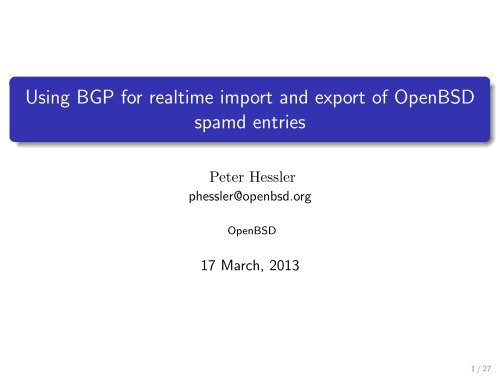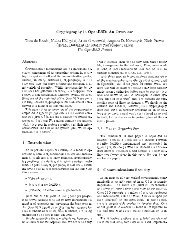Using BGP for realtime import and export of OpenBSD spamd entries
Using BGP for realtime import and export of OpenBSD spamd entries
Using BGP for realtime import and export of OpenBSD spamd entries
Create successful ePaper yourself
Turn your PDF publications into a flip-book with our unique Google optimized e-Paper software.
<strong>Using</strong> <strong>BGP</strong> <strong>for</strong> <strong>realtime</strong> <strong>import</strong> <strong>and</strong> <strong>export</strong> <strong>of</strong> <strong>OpenBSD</strong><br />
<strong>spamd</strong> <strong>entries</strong><br />
Peter Hessler<br />
phessler@openbsd.org<br />
<strong>OpenBSD</strong><br />
17 March, 2013<br />
1/27
what is this<br />
<strong>spamd</strong> uses IP host <strong>entries</strong>, to whitelist, blacklist or greylist hosts<br />
<strong>spamd</strong> can <strong>import</strong> <strong>and</strong> <strong>export</strong> these lists<br />
trivia: IP host <strong>entries</strong> can be represented as a route<br />
bgp is used to distribute IP route lists<br />
tie the two together, to simplify distributing these addresses<br />
2/27
<strong>spamd</strong><br />
written by Bob Beck<br />
included in <strong>OpenBSD</strong> since 3.3, greylisting added in 3.5<br />
uses greylisting to <strong>for</strong>ce unknown senders to retry delivery<br />
(very effective against bot-nets sending spam)<br />
uses blacklisting to reject mail from “known bad” senders<br />
fetches blacklists at the top <strong>of</strong> the hour from a web server<br />
3/27
gp<br />
bgp is the glue that holds the internet together<br />
used to distribute the 400k+ IPv4 routes <strong>of</strong> the Global Routing Table<br />
scales incredibly high, <strong>and</strong> incredibly fast<br />
very minor feature called “communities” that we will exploit<br />
4/27
gp communities<br />
allows you to mark a route with optional site-specific attributes<br />
bgp peers can use this to make arbitrary decisions on received routes<br />
route: 192.0.2.55/32 community: 65066:42<br />
this is our “secret sauce”<br />
5/27
openbgpd<br />
written by Henning Brauer <strong>and</strong> Claudio Jeker<br />
included in <strong>OpenBSD</strong> since 3.5<br />
s<strong>of</strong>tware based, so we can use the power <strong>of</strong> a general purpose OS<br />
...like scripting. or cron.<br />
6/27
openbgpd<br />
everything we use is already built-in to both <strong>spamd</strong> <strong>and</strong> bgpd, or are<br />
our custom scripts.<br />
...the ability to use “long” pf table names will be in the 5.3 release<br />
7/27
tying them together<br />
so, lets start to tie them together<br />
<strong>export</strong> IP address lists<br />
<strong>import</strong> IP address lists<br />
8/27
tying them together<br />
<strong>export</strong>ing IP addresses happens on the “<strong>spamd</strong>-source” systems.<br />
only list the specific IP addresses that exhibited a specific behaviour<br />
do NOT penalize network neighbors<br />
9/27
<strong>spamd</strong>-source<br />
“<strong>spamd</strong>-source” systems insert IP addresses to our feed<br />
really simplistic, we just want to catch the low-hanging-fruit<br />
10/27
<strong>spamd</strong>-source<br />
first, select known good upstream sources<br />
be conservative<br />
don’t whitelist the world<br />
don’t blacklist the world<br />
greylisting is powerful, when it still applies!<br />
11/27
<strong>spamd</strong>-source blacklist<br />
listed IP address sent mail to a “spam trap” address<br />
blacklist timeout <strong>of</strong> 24 hours<br />
do not be overly aggressive<br />
bgpctl network add 192.0.2.20/32 community 65066:666<br />
12/27
<strong>spamd</strong>-source whitelist<br />
semi-trusted email servers<br />
higher entry bar than normal <strong>spamd</strong> whitelist<br />
in the whitelist <strong>for</strong> 75 days, <strong>and</strong> sent more than 10 emails<br />
again, do not be overly aggressive<br />
bgpctl network add 192.0.2.55/32 community 65066:42<br />
13/27
oute server<br />
the center <strong>of</strong> our universe<br />
receives routes <strong>and</strong> communities from the <strong>spamd</strong>-source systems<br />
redistributes them to client/peers<br />
14/27
oute server<br />
only accept addresses from trusted <strong>spamd</strong>-source systems<br />
only accept host routes (/32)<br />
mark with our AS <strong>and</strong> community, <strong>for</strong> easy filtering<br />
match from group BS community neighbor-as:42 set community $myAS:42<br />
match from group BS community neighbor-as:666 set community $myAS:666<br />
15/27
client<br />
receives the black <strong>and</strong> white lists<br />
separates them out, <strong>and</strong> applies the local configuration<br />
16/27
client whitelist<br />
adds whitelist <strong>entries</strong> to a pf table<br />
allows whitelisted <strong>entries</strong> to bypass <strong>spamd</strong><br />
receive emails faster from servers that are semi-trusted elsewhere<br />
17/27
client whitelist<br />
$ cat /etc/pf.conf<br />
table persist<br />
table persist<br />
pass in proto tcp from any to any port smtp \<br />
rdr-to 127.0.0.1 port <strong>spamd</strong><br />
pass in proto tcp from to any port smtp<br />
pass in proto tcp from to any port smtp<br />
pass out proto tcp to any port smtp<br />
18/27
client blacklist<br />
why not simply use pf to block blacklist hosts?<br />
your ceo is expecting an email from a blacklisted system<br />
tell sending servers that they are being blacklisted on purpose<br />
19/27
client blacklist<br />
warning: Work In Progress ahead!<br />
20/27
client blacklist<br />
$ cat /usr/local/sbin/bgp-<strong>spamd</strong>.black.sh<br />
#!/bin/sh<br />
AS=65066<br />
bgpctl show rib community ${AS}:666 | awk ’{print $1}’ | \<br />
sed ’s/\/.*$//’ > /var/db/<strong>spamd</strong>.black<br />
/usr/libexec/<strong>spamd</strong>-setup<br />
# EOF<br />
21/27
client blacklist<br />
$ cat /etc/mail/<strong>spamd</strong>.conf<br />
all:\<br />
:bgp-<strong>spamd</strong>:<br />
bgp-<strong>spamd</strong>:\<br />
:black:\<br />
:msg="Your address %A has sent mail to a spamtrap\n\<br />
within the last 24 hours":\<br />
:method=file:\<br />
:file=/var/db/<strong>spamd</strong>.black:<br />
# EOF<br />
22/27
security concerns<br />
where do we get the IP addresses from?<br />
what is the criteria <strong>for</strong> adding an IP address to a black or white list?<br />
how do we prevent r<strong>and</strong>om clients from inserting in<strong>for</strong>mation?<br />
how does this tie in with the Global <strong>BGP</strong> Routing Table?<br />
wait, will this adjust the routes on my system/network?<br />
23/27
s.bgp-<strong>spamd</strong>.net<br />
this sounds interesting, can I use it?<br />
available today, at http://www.bgp-<strong>spamd</strong>.net<br />
I will run the above reference implementation <strong>for</strong> the entirety <strong>of</strong> 2013<br />
all configurations <strong>and</strong> scripts will be available.<br />
48457 blacklist <strong>entries</strong><br />
124527 whitelist <strong>entries</strong><br />
24/27
future work<br />
accelerate adding addresses to the bgp feed<br />
<strong>import</strong>/<strong>export</strong> <strong>of</strong> data between bgpd <strong>and</strong> <strong>spamd</strong><br />
network aggregation<br />
25/27
Acknowledgements<br />
Many thanks to<br />
my coauthor Bob Beck,<br />
Peter N.M. Hansteen <strong>of</strong> BSDly.net,<br />
Bob Beck <strong>of</strong> obtuse.com,<br />
the University <strong>of</strong> Alberta at ualberta.ca<br />
<strong>for</strong> being sources <strong>of</strong> <strong>spamd</strong>b in<strong>for</strong>mation.<br />
Sonic.net<br />
<strong>for</strong> hosting the reference implementation rs.bgp-<strong>spamd</strong>.net<br />
26/27
Questions?<br />
27/27
















